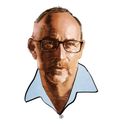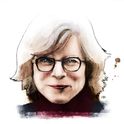If you could spend a day in one city or place at one moment in history, what would that be?
The great Buddhist university of Nalanda, which was to ancient India what the Library of Alexandria was to the classical Mediterranean.
What is your favourite quote?
“We will be judged on how well we loved. That’s it. That’s all that matters.” Said by Toni Morrison at the Hay Festival, 10 years ago.
Which of your ancestors or relatives are you most proud of?
There are two. One is James Prinsep, who deciphered the two most important scripts of ancient India: Brahmi and Kharosthi, so revealing to the world vast sweeps of lost early Indian history, including the existence of its greatest ancient ruler, Ashoka, and the fact that the Buddha lived in India. The other is Prinsep’s great-great niece, and my great-great aunt, Virginia Woolf.
What have you changed your mind about?
I originally resisted the idea that what the Israelis were up to in Gaza was genocide, rather than just mass murder or a terrible unforgivable slaughter. Now we have it from the mouths of many of their senior politicians that this is indeed their intention.
What is the last piece of music, play, novel or film that brought you to tears?
Olivia Chaney singing “Oblivion Soave” from Monteverdi’s Poppea. (Look it up on YouTube—I defy anyone not to weep from the sheer beauty of it. That said, I cry very easily and once was caught by my kids crying during a particularly schmaltzy insurance advert in a cinema.)
Your most recent book highlights ancient India’s influence on the world. What finding most surprised or delighted you during the writing of it?
One was the realisation that what we in the west call Arabic numbers were actually invented in India, something the Arabs remember (they still call them Hindu numbers) but we have completely forgotten. Another was that the largest Hindu temple in the world was built not in India but in Cambodia. Angkor Wat is today a Buddhist holy site, but it was originally built in the 12th century as a temple to Vishnu—an especially spectacular example of the way in which India seeded so much of the civilisation of southeast Asia.
Why do you think that influence has been underappreciated?
The malign influence of Victorian indology, which undermined, misrepresented and devalued Indian history, culture, science and knowledge from the period of Macaulay onwards. If India were acknowledged to already have been a powerful, cosmopolitan and profoundly sophisticated civilisation, then what justification would there be for Victorian Britain’s civilising mission? How would you set out to bring civilisation to a part of the world that you recognised has been supremely civilised for thousands of years and which indeed was spreading its influence long before the coming of Christianity?
You also cohost the Empire podcast with Anita Anand. Give us your take on empire itself. Good? Bad? In between?
As a general rule, it is of course better that people should rule themselves rather than have another people rule over them, exploit their raw materials and govern for the benefit of another country far away. So, yes, empires are an inherently unjust form of government. But they were also the norm for most of human history, and we should try and remember both those facts when talking about imperial history.
What do you most regret?
Going out for a walk one winter afternoon seven years ago and not being in the room when my father died. Also not saying proper goodbyes to two close friends who recently died of cancer: Patrick French and Bruce Wannell. The terrible, irreversible finality of death means you can never make it up to the people you love if you miss those last minutes. The moment has passed and there is absolutely nothing you can do.
William Dalrymple’s The Golden Road: How Ancient India Transformed the World (Bloomsbury, £12.99) is now available in paperback












